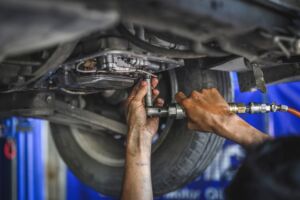The transmission is like the heart of your car. It draws power from the engine and delivers it to the wheels, enabling your vehicle to move. It’s a complex mechanical system that can wear down over time and needs regular maintenance and occasional repairs.
Whether you’re a seasoned driver or a novice behind the wheel, knowing how to spot early warning signs of transmission issues can save you from more serious trouble down the line.
When your transmission starts to falter, it’s crucial to recognize the signs before a full rebuild or replacement becomes necessary. In this blog, we’ll look at key signs your transmission needs a repair to help you keep your car on the road and running smoothly for as long as possible.
10 Signs Your Transmission Needs a Repair
1. A Burning Smell
A burning or smoky odour coming from your vehicle is never normal. In many cases, it means your transmission fluid is overheating or breaking down. Burnt fluid loses its ability to lubricate and cool internal components, which can lead to accelerated wear or total transmission failure.
While overheating engines can cause similar smells, either situation requires immediate attention. If you notice a burning smell, schedule a transmission repair service as soon as possible.
2. Gears Slipping
If your vehicle unexpectedly changes gears, struggles to stay in gear, or hesitates during acceleration, your transmission may be slipping. You might notice delayed response, sudden jerks, or a lack of power even though the engine seems fine.
Gear slipping can make your vehicle unpredictable—especially dangerous in traffic or on highways. This is one of the clearest signs you should book a transmission repair service right away.
3. Check Engine Light
The check engine light doesn’t always mean a transmission problem—but it shouldn’t be ignored. Modern vehicles use sensors that monitor transmission performance, and issues like slipping, overheating, or electronic faults can trigger the warning light.
Ignoring it can allow a small issue to escalate into a major repair. A professional diagnostic scan can quickly identify whether the transmission is the source of the problem.
4. Transmission Fluid Under Your Car
Transmission fluid is essential for lubrication, cooling, and power transfer. If you notice bright red or dark reddish-brown fluid pooling under your vehicle, you likely have a leak.
Transmission fluid often has a slightly sweet smell and should never leak under normal conditions. Low fluid levels can cause severe internal damage, so leaks should be addressed immediately.
5. Unusual Noises
Whining, humming, clunking, or grinding noises—especially during gear changes—are common indicators of a transmission that needs a repair.
- Whining or humming may point to worn bearings or fluid issues
- Grinding in manual transmissions can signal worn synchronizers or gears
- Grinding in automatics may indicate internal damage or low fluid
Any unfamiliar noise deserves professional attention.
6. Refusal to Switch Gears
If your vehicle hesitates, jerks, or outright refuses to change gears, your transmission may be struggling. Low fluid levels, incorrect fluid type, or internal mechanical issues can all cause shifting problems.
This issue won’t resolve on its own and typically worsens over time.
7. Noises When in Neutral
Hearing unusual noises when your vehicle is in neutral can indicate worn components or contaminated transmission fluid. In some cases, a fluid flush may help—but persistent noise could signal deeper mechanical problems that require a transmission repair or rebuild.
8. Dragging Clutch
A dragging clutch occurs when the clutch doesn’t fully disengage from the flywheel. This causes lash and can make shifting difficult or cause the vehicle to creep forward when it shouldn’t.
Dragging clutches are often caused by mechanical wear, misalignment, or hydraulic issues and should be inspected promptly to avoid further damage.
9. Grinding or Shaking
Grinding, shuddering, or shaking when shifting—especially in automatic transmissions—is a strong indication of internal transmission problems. These symptoms often worsen quickly and can lead to complete transmission failure if ignored.
10. Delayed or No Response
If your vehicle hesitates—or doesn’t respond at all—when shifting from park to drive or reverse, your transmission likely needs a repair service. This symptom can be caused by fluid issues, worn components, or internal damage and should be inspected immediately.
Schedule a Transmission Repair in Edmonton
Transmission repairs are not a DIY job for most drivers. Modern transmissions require specialized tools, training, and diagnostics to repair them correctly.
At Dot Transmissions, our experienced technicians specialize in diagnostic and transmission repair in Edmonton—whether it’s a minor adjustment, fluid service, or a more complex repair. Addressing problems early can save you time, money, and stress.
If your vehicle is showing any of these warning signs, don’t wait. Contact Dot Transmissions today to book your transmission inspection and repair, and keep your car running safely and smoothly on Edmonton roads.
FAQs About Transmission Repair
What is transmission repair?
Transmission repair refers to the process of fixing issues related to the transmission system in a vehicle, including a transmission fluid change or flush, seal or gasket replacement, and clutch repair, among others.
Is it better to repair or replace a transmission?
Whether to repair or replace a transmission depends on several factors, including the extent of the damage, the age and overall condition of the vehicle, and the cost-effectiveness of each option.
Can an automatic transmission be repaired?
Yes, an automatic transmission can certainly be repaired. In fact, regular maintenance and timely repairs are essential to prolonging the life of an automatic transmission and ensuring the smooth operation of your vehicle.
How long does a transmission repair last?
The longevity of a transmission repair can vary depending on various factors, including the extent of the repair, the quality of the repair work, the overall condition of the transmission, and how well the vehicle is maintained afterward.






